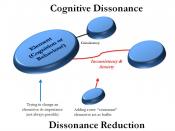An attitude is a learned, stable, and relatively enduring evaluation of a person, object or idea that can influence an individual's behavior. However, sometimes individuals' attitudes on particular issues change through two main processes: persuasion and cognitive consistency. Persuasion, or any attempt to change an attitude or behavior naturally varies in form depending on the individual and the situation in which it takes place. Therefore it is best classified through three basic approaches: the central, peripheral, and memory routes to persuasion. Cognitive Consistency, the second major mechanism of attitude change, deals with the theory of Cognitive Dissonance, or the idea that when people's behavior changes, their attitudes will change. While persuasion and Cognitive Consistency serve similar purposes, they operate under very different circumstances.
The first main route to persuasion, the central route, refers to when people take a decision seriously and invest the necessary time and effort to carefully evaluate the evidence and logic behind each message.
This route is generally more effective with highly intelligent people who have greater capacities to digest a large amount of complex information and are more prone to exert the time and energy to carefully evaluate it. For example, if an individual speaks to a room of mathematicians on a controversial new theory in calculus, the audience members would most likely weigh the evidence presented by the speaker in relation to the great deal of knowledge they already posses on the subject matter and evaluate it accordingly. Additionally, an audience of mathematicians would be more interested in the topic than would an audience of English teachers and would therefore contemplate the speaker's proposal with greater effort.
The peripheral route to persuasion, on the other hand, refers to when people listen to a message on a topic of little importance to them and...


